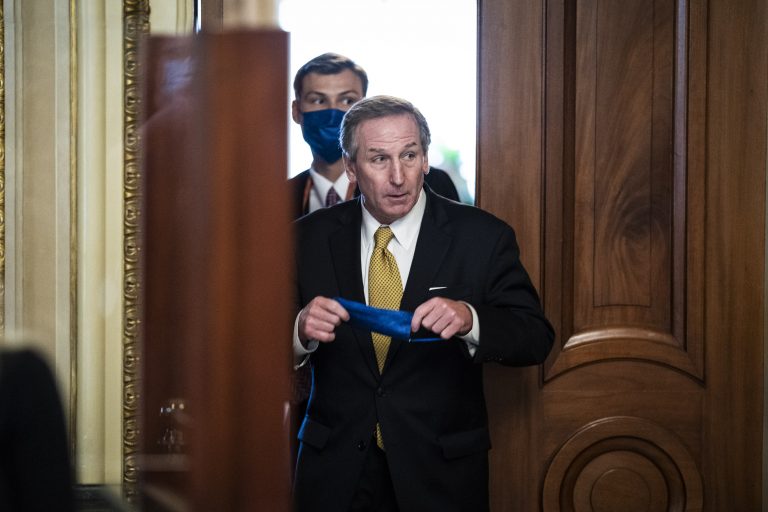Attorneys for Donald Trump had the opportunity to present their defense to the Senate today. Under the rules of the impeachment trial, both sides are given two days or 16 hours to complete their presentations. The defense completed their opening arguments in approximately three hours. The full four-hour question and answer period from Senators was completed the same day.
Trump’s lawyers focused on two key points as they made the case for the acquittal of their client. The first was House Managers’ selective editing and presentation of audio-visual evidence, and the second was to establish a bona fide legal framework surrounding First Amendment rights of persons who hold office, and whether Trump is guilty of inciting the Jan. 6 riots as charged in the Article of Impeachment.
Michael van der Veen made his first appearance during the trial and was perhaps his team’s strongest oral arguer during both the presentation phase and the question and answer period. Van der Veen opened by showing a montage of Democrat House members, including Lead Impeachment Manager Rep. Jamie Raskin (D-MD), objecting to Trump’s Electoral College votes in 2017. Democrats were shown being gavelled down by then President of the Senate, Vice President Joe Biden because no objections were presented that were also signed by a member of the Senate.
The driving force of impeachment
He reminded Senators that Democrats spread unfounded conspiracy theories in 2016 about Trump being a Russian spy, a traitor, and an imposter and that the election was hijacked by foreign countries. Van der Veen also noted that one of the first people arrested on Jan. 6 was “the leader of Antifa” and that Democrats and D.C. Mayor Muriel Bowser rejected federal aid when Trump offered it during the summer when the anarcho-Communist group rioted alongside Marxist-funded Black Lives Matter.
Van der Veen called the impeachment, “Constitutional cancel culture” and said the unprecedented second impeachment of the same President in the same term was “not about Democrats opposing political violence. It is about Democrats trying to disqualify their political opposition.” He warned, “History will record this shameful effort as a deliberate attempt by the Democrat Party to smear, censor and cancel not just President Trump, but the 75 million Americans who voted for him.”
Success
You are now signed up for our newsletter
Success
Check your email to complete sign up
David Schoen, who only made a brief appearance in today’s proceedings, argued that when Speaker Nancy Pelosi called for a 9/11-style commission to investigate the “facts, causes and security relating to the terrorist mob attack on January 6” in a Feb. 2 press release, it cast doubt on how Trump could be charged with incitement.
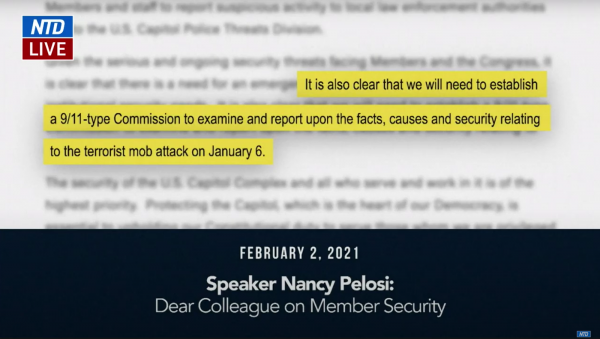
“She says it herself. If an inquiry of that magnitude is needed to determine the causes of the riot, and it may very well be, then how can these same Democrats have the certainty needed to bring articles of impeachment and blame the riots on President Trump? They don’t. The House Managers, facing a significant lack of evidence turned off into press reports and rumors during these proceedings, claims that would never meet the evidentiary standards of any court.”
Violation of due process
Schoen’s presentation played several audio-video mashups of House Managers’ prior two days of the presentation showing media reports about the Capitol riots and Trump’s alleged involvement in the events, “The frequency with which House Managers relied on unproven media reports shocked me as I sat in this chamber.”
Schoen played a montage that focused on the repetition in the Dems’ footage of the word “reportedly.”
“As any trial lawyer will tell you, ‘reportedly’ is a euphemism for ‘I have no real evidence.’ Reportedly is not the standard in any American setting in which any semblance of due process is afforded an accused. Reportedly isn’t even ‘here is some circumstantial evidence.’ It is exactly as reliable as ‘I Googled this for you.’”
He turned his attention to the topic of due process, or the legal and procedural rights an accused is afforded by law in countries that are not run by totalitarian regimes, “And if you’re worried you might ever be tried based on this type of evidence, don’t be. You get more due process than this when you fight a parking ticket.”
“One reason due process is so important with respect to evidence offered against an accused is that it requires an opportunity to test the integrity, the credibility, the reliability of the evidence…and it turns out there is significant reason to doubt the evidence the House Managers have put this before us.”
Manipulated evidence
Schoen then switched feet to claim House Managers manipulated and selectively edited the evidence and footage they presented, “If they did and this were a court of law, they would face sanctions from a Judge. I don’t raise this issue lightly, rather, it is a product of what we have found in just the limited time we have had since we first saw this evidence here with you this week.”
He showed a portion of Trump’s speech on Jan. 6 which House Managers had edited to make it look like Trump was calling for the crowd to march and riot. This portion of Trump’s speech was heavily and repeatedly relied on during the Democrats’ 14 hours of presentation.
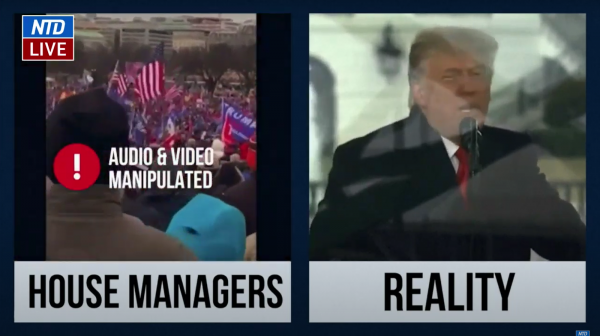
Trump said, “We’re going to walk down to the Capitol and we’re going to cheer on our brave Senators and Congressmen and women, and we’re probably not going to be cheering so much for some of them. Because you’ll never take back our country with weakness. You have to show strength and you have to be strong. We have come to demand that Congress do the right thing and only count the electors who have been lawfully slated. Lawfully slated. I know that everyone here will soon be marching over to the Capitol Building to peacefully and patriotically make your voices heard.”
Schoen also revealed the full context of Trump’s speech where the President told his supporters to use primary elections to deal with Republicans who wouldn’t “fight” what they regarded as election fraud, “You have to get your people to fight, and if they don’t fight we have to primary the Hell out of the ones who don’t fight. You primary them. We’re going to let you know who they are. I can already tell you, frankly,” said Trump.
“A lie will travel halfway around the world before the truth will have a chance to put its shoes on,” said Schoen.
Political hatred
Michael van der Veen returned to argue against Rep. Joe Neguse (D-CO)’s claim the day prior that Trump could not use the First Amendment to protect himself precisely because of his responsibilities and position as President.
“This case, unfortunately, is about political hatred. It has become very clear that the House Democrats hate Donald Trump. This type of political hatred has no place in our political institutions and certainly no place in the law. This hatred has led the House Managers to manipulate and selectively edit Mr. Trump’s speech to make it falsely appear that he sought to incite the crowd to violently attack the capitol. He didn’t and we will show you why.”
He continued, “But yesterday, they gave you a new and novel standard of incitement with an element of foreseeability, a negligence concept. They cite zero case law. They made it up. This task of applying a completely made up legal standard of incitement to an impeachment proceeding is truly an unprecedented task for the Senate, and that is something the Senate must seriously consider when deciding the issue.”
“This is distinctly not the intent of the Framers. The Framers were aware of the danger of any impeachment process that would make the President the ‘mere creature of the legislature,’ a quote directly from the Framers while debating the impeachment process on the floor of the Constitutional Convention of 1787.”

The defense turned their attention to a letter by more than 140 legal professionals that were repeatedly cited by Dems in their opening arguments because it called the Defense’s First Amendment briefings “legally frivolous.” Van der Veen characterized this as “really an outrageous attempt to intimidate Mr. Trump’s lawyers” because of the professional and legal consequences within different State bars and law societies for failure to practice with due ethical standards are often extremely steep for lawyers, “Whenever a lawyer advances a truly frivolous argument they may violate professional, ethical rules and could be subject to discipline,” he said.
“Interestingly the law professors’ letter was issued on Feb 5, three days before we even filed our legal brief in this matter, and they ignored landmark bedrock Supreme Court cases directly addressing this issue,” said van der Veen.
‘Enhanced free speech rights’
“All analogies given by the House Managers, these sideways analogies are wrong. Mr. Trump was an elected official and there’s an entire body of law, Supreme Court landmark cases supporting the conclusion that Mr. Trump actually has enhanced free speech rights because he is an elected official.”
“These cases are ignored by the House Managers and the law professors. And that too, is total intellectual dishonesty.”
The defence cited two specific Supreme Court cases, Wood v. Georgia and Bond v Floyd.
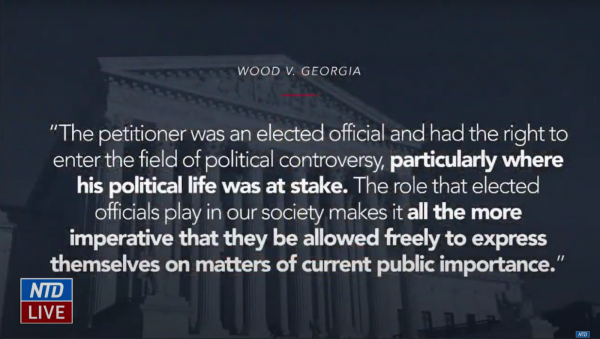
Van der Veen explained Wood was a case involving a sitting sheriff in cases of irregular voting. The Sheriff spoke publicly in multiple press releases calling the grand jury’s investigations racist, illegitimate, and an attempt to intimidate voters. He publicly urged the grand jury on how to decide the issues and instructed them to not let its office be used as a tool to influence the public’s vote because he viewed the grand jury’s actions as a challenge to the legitimacy of his election. The sheriff even sent a letter to the grand jurors, something strictly legally taboo.
The Sheriff was charged and convicted of contempt of court and obstruction of a grand jury.
But the Supreme Court reversed the conviction. “The Court held that the First Amendment protected an elected public official’s speech because the voting controversy directly affected the Sheriff’s political career,” said van der Veen.
Bond v. Floyd was about a state legislature punishing an elected official for protected political speech because he encouraged the burning of draft cards.
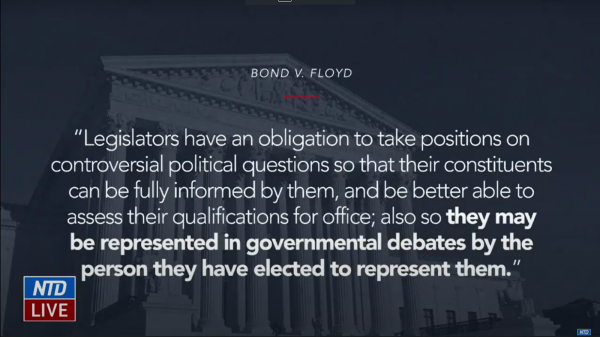
Trump’s defense team said Bond held that “legislators be given the widest latitude to express their views on issues of policy.”
“Mr. Trump enjoys this same First Amendment protection from Congress. The First Amendment’s protections guarantee free speech addressing the electoral integrity issues essential to his career that Mr. Trump has consistently advocated.”
Van der Veen continued, “The House Managers argue that the First Amendment ‘does not shield public officials that occupy sensitive policy making positions from adverse actions when their speech undermines important governmental interests’,” he said. “That is flat wrong. They are, in essence, attempting to treat Mr. Trump as their employee. This is not the law under Wood and Bond.”
“Mr. Trump was elected by the people. He is an elected official. The Supreme Court says elected officials must have the right to freely engage in public speech.”
According to Trump’s attorneys, House Managers ignored Wood and Bond when crafting their brief and their presentation because “It does not fit their narrative or their story. They want to punish Mr. Trump for engaging in Constitutionally protected free speech and they do not want you to consider the issue. But you must.”
But at the core of Trump’s defense was that the Senate may not simply use the court of public opinion or hotly-worded allegations of racism and white supremacy to judge whether Trump’s words incited the break in.
The ‘Brandenburg Test‘
Instead, the Senate must use an actual legal standard from Supreme Court case law called the “Brandenburg Test.”
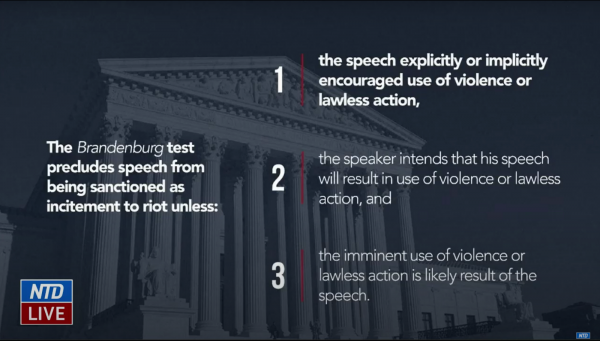
The Test is threefold and each must be satisfied to constitute incitement. First, the speech has to “explicitly or implicitly” encourage the use of violence or lawlessness. Second, the speaker must intend his speech to result in violence or lawlessness. Third, the imminent use of violence or lawlessness must be the “likely result” of the speech.
“Brandenberg requires a close examination of the words themselves,” explained van der Veen, referring to the words uttered by Trump during and before Jan. 6. “The words were either important or they’re not. The House Managers admitted that the incitement issue is not about the words. Why not? Because on the face of it, Mr. Trump’s words are no different than the figurative speech by every one of the Senators assembled here today.”
“If it is not about the words, but about the ‘Big Lie’ of a stolen election, then why isn’t House Manager Raskin guilty since he tried to overturn the 2016 election?”
“The more the House Managers speak the more hypocrisy gets revealed.”
Taken in context, Trump’s words cannot be mistaken for inciting violence
“These are the words,” said van der Veen as he quoted President Trump’s speech: “I know that everyone here will soon be marching over the Capitol building to peacefully and patriotically make your voices heard.”
Van der Veen continued, “That is how this President has spoken for years when he condemns violence, lawlessness, and rioters. The House Managers have played manipulated, selectively edited parts of Mr. Trump’s speech.”
To make his point, Trump’s defense presented the full quote surrounding the “If you don’t fight like Hell…” comments.
The former President said: “I think one of our great achievements will be election security because nobody, until I came along, had any idea how corrupt our elections were. And again most people would stand there at nine o’clock in the evening and say ‘I want to thank you very much’ and they go off to some other life. But I said ‘something’s wrong here, something’s really wrong, can’t have happened.’ And we fight. We fight like Hell, and if you don’t fight like Hell you’re not going to have a country anymore. Our exciting adventures and boldest endeavors have not yet begun. My fellow Americans, for our movement, for our children, and for our beloved country, and I say this despite all that’s happened. And I say this despite all that’s happened, the best has yet to come.”
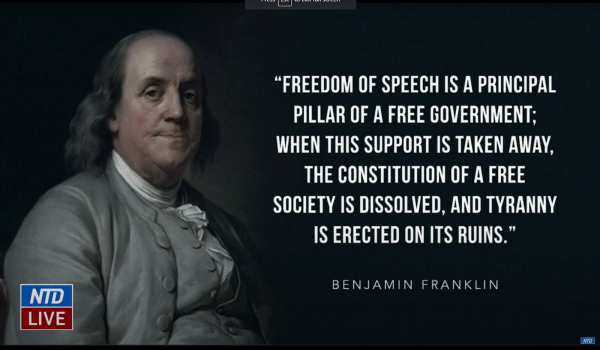
Castor: Question is of incitement, not whether the riots were deplorable
Bruce Castor, lead attorney for the Trump defense team, who did not perform well in the Day 1 motion to determine if the Senate had jurisdiction to try a President for Impeachment when he no longer holds office said, “The only question is of incitement. Defense openly concedes that the riots at the Capitol were condemnable and was never in question.”
Castor made these statements because “the House Managers, knowing it was not contested at all, chose to spend 14 plus hours showing you pictures of how horrific the attack on the United States Capitol was. They spent no time at all in connecting legally the attack on the Capitol to the 45th President of the United States, which is the only question that needs to be answered.”
“We know the President did not incite the riot because of his plain words that day, as Mr. Vanderveen elucidated on a few moments ago.”
Castor also referenced the Brandenburg Test, saying the House’s argument that Trump is responsible was “completely eviscerated by the fact that the violence was preplanned as confirmed by FBI, the Department of Justice, and even the House Managers,” and was “Not the result of the speech at all.”
Articles of Impeachment improperly handled
He also took aim at Rep. David Cicilline’s (D-RI) argument that the way the Articles of Impeachment were passed in the House without the presentation of evidence was fine, because the house served as a grand jury while the Senate was an actual courtroom. ”I’ve been in grand jury proceedings. I have run grand juries. In grand jury proceedings you call witnesses, you hear evidence, you make transcripts, you take affidavits, you develop physical evidence, you hear reports from police officers, you hear forensic analysis from scientists.”
“Which one of those things happened in the House prior to the Impeachment Article?”
After Trump’s lawyers completed their arguments early, the Senate began its four-hour question-and-answer period. Any Senator was permitted to ask a question to either the House Managers or the Defense, with the respondent being given a maximum of five minutes to speak. If a question was posed to both the House and the Defense, the time would be split equally.
House Managers seemed to be on the back foot and off-balance during the session. Although they were very well presented during their fourteen-hour presentation, opening arguments were choreographed, scripted, and practiced. They now had to respond ad hoc to the Senate on the back of a very compelling legal argument by the President’s attorneys, which, if it holds water, stops the case for impeachment dead in its tracks.
At one point, Raskin made a comment about having fun with the proceedings during a split question and drew the ire of Michael van der Veen, “There was nothing fun here, Mr. Raskin. We aren’t having fun here. This is about the most miserable experience I’ve had down here in Washington, D.C. There’s nothing fun about it, and in Philadelphia where I come from, when you get caught doctoring the evidence, your case is over.”
“And that’s what happened. They got caught doctoring the evidence, and this case should be over.”
House Managers spent the entirety of their time repeating the same narratives they had for the previous two days, which often boiled down simply to the fact that rioting happened, a lot of property was destroyed, people were hurt, and lives were lost, and because of that, Trump had to be responsible because he continued to oppose the results of the election.
Dems were simply unable to respond to the material facts or basis of the Defense’s arguments.
Was Trump’s speech inciteful?
Rep. Bernie Sanders (I-VT) asked for the counsel’s opinion on whether Trump won the election or if “the Big Lie” theory presented by the House were true. Van der veen called the question “irrelevant to the question before this body.”
“What’s relevant in this Impeachment Article is: Were Mr. Trump’s words inciteful to the point of violence and riot? That’s the charge, that’s the question,” he said.
“And the answer is no. He did not have speech that was inciteful to violence or riot. What’s important to understand here is that the House Managers have completely, from the beginning of this case until right now, done everything except answer that question, the question they brought before you. The question they want my client to be punished by. That’s the question that should be getting asked.”
“And the answer is [Trump] advocated for peaceful, patriotic protest. They’re his words. The House Managers have showed zero, zero. Evidence that his words did anything else.”
Bad precent could endanger free speech
Van der Veen reminded Senators that, according to the House, all of the evidence they provided showed the attack was planned in advance, and because it was pre-planned, it could not pass the third part of the Brandenburg Test, because the “imminent use” of violence or lawlessness could not have happened as the House Democrats’ metaphor described where Trump’s speech was the same as lighting a match in a powder keg if the riots were premeditated by certain groups.
Trump’s defense said an impeachment trial that uses such a low standard of due process and evidentiary requirements “also poses a serious threat to freedom of speech for political leaders of both parties at every level of government.”
Van der Veen warned, “The Senate should be extremely careful about the precedent this case will set. Consider the language the House Impeachment Article alleges to constitute incitement: ‘If you don’t fight like Hell you’re not going to have a country anymore.’ This is ordinary political rhetoric that is virtually indistinguishable from the language that has been used by people across the political spectrum for hundreds of years.”
Day 5 of the impeachment trial continues tomorrow at noon EST.
Follow us on Twitter or subscribe to our email list



